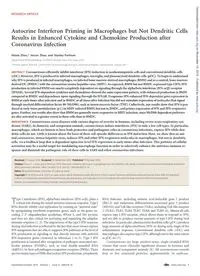
2010 Autocrine Interferon Priming in Macrophages but Not Dendritic Cells Results in Enhanced Cytokine and Chemokine Prod PDF
Preview 2010 Autocrine Interferon Priming in Macrophages but Not Dendritic Cells Results in Enhanced Cytokine and Chemokine Prod
Autocrine Interferon Priming in Macrophages but Not Dendritic Cells Results in Enhanced Cytokine and Chemokine Production after Coronavirus Infection Haixia Zhou,* Jincun Zhao, and Stanley Perlman Department of Microbiology, University of Iowa, Iowa City, Iowa, USA * Present address: Beirne B. Carter Center for Immunology Research, University of Virginia, Charlottesville, Virginia, USA. ABSTRACT Coronaviruses efficiently inhibit interferon (IFN) induction in nonhematopoietic cells and conventional dendritic cells (cDC). However, IFN is produced in infected macrophages, microglia, and plasmacytoid dendritic cells (pDC). To begin to understand why IFN is produced in infected macrophages, we infected bone marrow-derived macrophages (BMM) and as a control, bone marrow- derived DC (BMDC) with the coronavirus mouse hepatitis virus (MHV). As expected, BMM but not BMDC expressed type I IFN. IFN production in infected BMM was nearly completely dependent on signaling through the alpha/beta interferon (IFN-�/�) receptor (IFNAR). Several IFN-dependent cytokines and chemokines showed the same expression pattern, with enhanced production in BMM compared to BMDC and dependence upon signaling through the IFNAR. Exogenous IFN enhanced IFN-dependent gene expression in BMM at early times after infection and in BMDC at all times after infection but did not stimulate expression of molecules that signal through myeloid differentiation factor 88 (MyD88), such as tumor necrosis factor (TNF). Collectively, our results show that IFN is pro- duced at early times postinfection (p.i.) in MHV-infected BMM, but not in BMDC, and primes expression of IFN and IFN-responsive genes. Further, our results also show that BMM are generally more responsive to MHV infection, since MyD88-dependent pathways are also activated to a greater extent in these cells than in BMDC. IMPORTANCE Coronaviruses cause diseases with various degrees of severity in humans, including severe acute respiratory syn- drome (SARS). In domestic and companion animals, coronaviruses induce interferon (IFN) in only a few cell types. In particular, macrophages, which are known to have both protective and pathogenic roles in coronavirus infections, express IFN while den- dritic cells do not. Little is known about the basis of these cell-specific differences in IFN induction. Here, we show that an ani- mal coronavirus, mouse hepatitis virus, induces IFN and other IFN-responsive molecules in macrophages, but not in dendritic cells, via a feedback loop that is dependent upon low-level IFN expression at early times after infection. This pathway of cellular activation may be a useful target for modulating macrophage function in order to selectively enhance the antivirus immune re- sponse and diminish the pathogenic role of these cells in SARS and other coronavirus infections. Received 21 August 2010 Accepted 20 September 2010 Published 19 October 2010 Citation Zhou, H., J. Zhao, and S. Perlman. 2010. Autocrine interferon priming in macrophages but not dendritic cells results in enhanced cytokine and chemokine production after coronavirus infection. mBio 1(4):e00219-10. doi:10.1128/mBio.00219-10. Editor Michael Buchmeier, University of California, Irvine Copyright © 2010 Zhou et al. This is an open-access article distributed under the terms of the Creative Commons Attribution-Noncommercial-Share Alike 3.0 Unported License, which permits unrestricted noncommercial use, distribution, and reproduction in any medium, provided the original author and source are credited. Address correspondence to Stanley Perlman,
